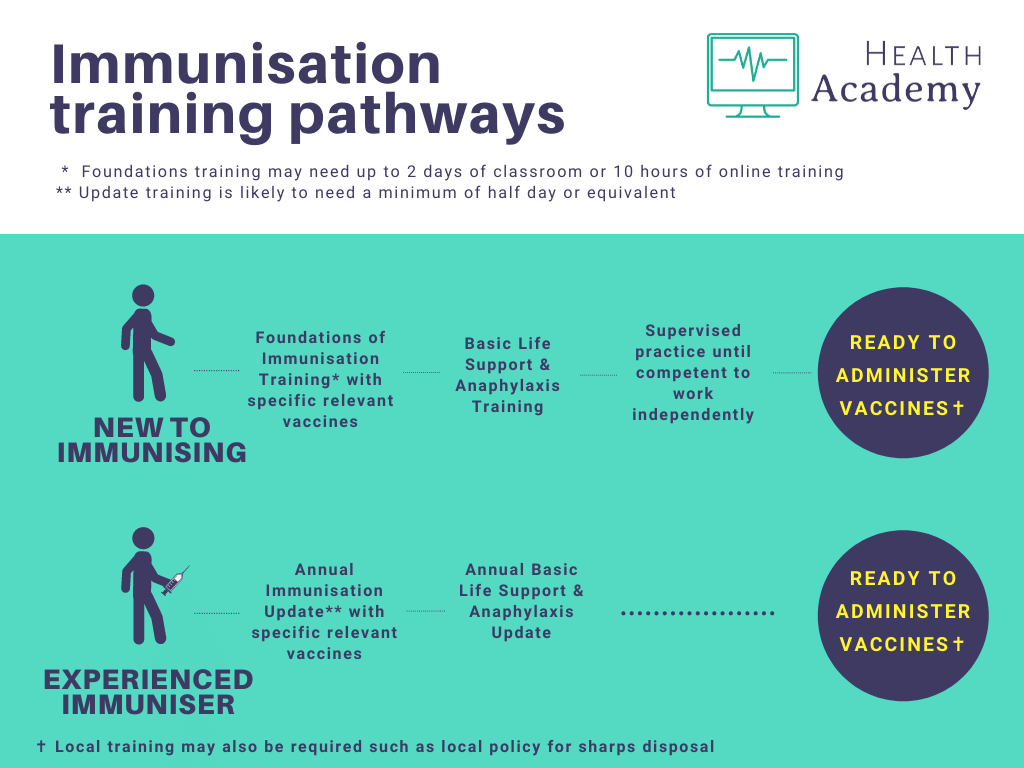
I know, it’s only June, so surely we can’t be talking about updating your flu training already. It seems like we’ve only just come out of that long winter we had this year.
If vaccination fatigue is a thing, I am sure that every health professional must be suffering with it, so seeing a post about flu training for 2023/24 may be a little too much. For a lot of you reading this post right now, you or your team have probably given more vaccinations in the past three years than your whole professional life. With this sort of background, it is easy for us all to get complacent about keeping our training up to date, but updating our training is an essential part of keeping us, and our patients safe.
As a quick recap, here are the training requirements for all healthcare professionals when it comes to vaccination:

Why are we talking about flu training now then? We understand that for many healthcare organisations, accessing training is a fine balance between releasing staff, finding the right provider, deciding if the training can be delivered on zoom etc etc, and these considerations are just the tip of the iceberg. But here are a few reasons why you should make sure you find the time to keep up to date:
Flu vaccines are medical interventions that must be administered correctly to ensure patient safety. Training equips healthcare professionals with the knowledge and skills to handle vaccines properly, including understanding the proper storage, handling, and administration techniques. By undergoing training, healthcare professionals can minimize the risk of errors or complications during the vaccination process
Vaccines are most effective when administered correctly. Healthcare professionals need to be trained on the specific vaccine formulation being used, including any updates or changes in the vaccine composition. By staying up-to-date with the latest information, they can ensure the vaccine is administered appropriately, maximising its effectiveness in preventing influenza.
Healthcare professionals play a crucial role in educating patients about the importance and benefits of receiving the flu vaccine. Training allows them to stay informed about the latest research, vaccine recommendations, and addressing common misconceptions or concerns. This knowledge empowers healthcare professionals to effectively communicate with patients, increasing vaccine acceptance rates and promoting public health.
Although rare, adverse events can occur following vaccination. Healthcare professionals need to be well-versed in recognising and managing any potential adverse reactions promptly. Training provides them with the necessary skills to identify and respond to adverse events appropriately, ensuring patient safety and well-being.
Training programmes often include assessments and evaluations to ensure healthcare professionals have acquired the necessary knowledge and skills. These assessments help maintain a high standard of vaccine administration but also help to show that practitioners are developing and can be used as evidence for their portfolio.
UK national health programmes have already published this years cohorts that will be offered the flu vaccination on the NHS. There are a few crucial changes to the cohorts being offered the vaccine this year compared to last year, and there are also key differences between the different home nations. At time of writing we are still waiting to hear the full extent of the programme in schools in England. Fortunately, you do not need to worry about this, as we will keep on top of all these announcements and update our training when the decisions are made.
Whether you are the person that books the training for your organisation, or even if you have your training booked for you, it is never too early to get organised.
Do you need to plan the training around your summer holidays? Is it your responsibility to make sure that the whole team is up to date with their training? Are you the type of professional that likes to get the training done early and then revisit it before the season starts? Do you need to book a workshop session including BLS, Anaphylaxis & Vaccination skills? Does your clinic need a private flu PGD?
If the answer is yes to any of these questions, we can help make sure that you or your organisation is ready for the season well in advance. Visit our dedicated Flu Hub now to explore all of this years flu options.

Giving you written and video content to answer all your questions on primary care education from Phlebotomy to Travel Health.
Subscribe now to be kept updated with our latest posts and insights.
Start typing to search courses, articles, videos, and more.